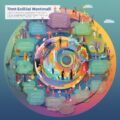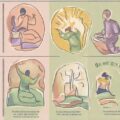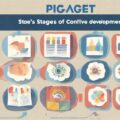Understanding the various stages of psychosocial development is essential for comprehending human growth and personality development. Erik Erikson, a notable developmental psychologist, proposed a theory that characterizes eight stages through which a healthily developing human should pass from infancy to late adulthood. In each stage, the individual faces, and hopefully masters, new challenges. Each stage builds upon the successful completion of earlier stages. The challenges of stages not successfully completed may be expected to reappear as problems in the future.
The Trust vs. Mistrust Stage
The first stage, occurring between birth and one year, is centered on developing trust when caretakers provide reliability, care, and affection. A lack of this will lead to mistrust.
The Autonomy vs. Shame and Doubt Stage
During the ages of one to three years, children begin to assert their independence. If caregivers encourage this self-sufficiency, the child will become more confident and secure in their ability to survive in the world. If not, they may feel inadequate and become overly dependent upon others, lacking self-esteem, and feeling a sense of shame or doubt in their own abilities.
The Initiative vs. Guilt Stage
Between ages three and five, children assert themselves more frequently. They begin to plan activities, make up games, and initiate activities with others. If given the opportunity, children develop a sense of initiative and feel secure in their ability to lead others and make decisions. Conversely, if this tendency is squelched, either through criticism or control, children develop a sense of guilt.
The Industry vs. Inferiority Stage
From age five to twelve, children compare themselves to their peers and begin to develop a sense of pride in their accomplishments and abilities. If children are encouraged and reinforced for their initiative, they begin to feel industrious (competent) and confident in their ability to achieve goals. If this initiative is not encouraged, if it is restricted by parents or teacher, then the child begins to feel inferior, doubting their own abilities and therefore may not reach their potential.
The Identity vs. Role Confusion Stage
During adolescence, the transition from childhood to adulthood is most important. Teens need to develop a sense of self and personal identity. Success leads to an ability to stay true to oneself, while failure leads to role confusion and a weak sense of self.
The Intimacy vs. Isolation Stage
In young adulthood, individuals are faced with the challenge of forging intimate relationships. Success at this stage leads to fulfilling relationships. Failure results in loneliness and isolation.
The Generativity vs. Stagnation Stage
This stage covers the period of middle adulthood when people are establishing their careers, settling down within a relationship, beginning their own families, and developing a sense of being a part of the bigger picture. By failing to achieve these objectives, individuals become stagnant and feel unproductive.
The Ego Integrity vs. Despair Stage
As individuals grow older and become seniors, they tend to slow down their productivity and explore life as a retired person. It is during this time that they contemplate their accomplishments and can develop integrity if they see themselves as leading a successful life. If they look back on life with few accomplishments, they may feel a sense of despair.
FAQ on Erikson’s Psychosocial Development
Q: What is the importance of Erikson’s theory?
A: Erikson’s theory is important as it provides a comprehensive framework for understanding human development from infancy to old age, emphasizing emotional and psychological growth.
Q: How can Erikson’s stages be applied in everyday life?
A: Erikson’s stages can guide parents, educators, and individuals to better understand development milestones and challenges at various life stages, helping to foster personal growth and self-awareness.
Q: Can stages be revisited later in life?
A: Yes, unresolved challenges from earlier stages can reemerge in later life, offering opportunities for personal development and growth.
Q: Is Erikson’s theory still relevant today?
A: Absolutely, despite being proposed over half a century ago, Erikson’s theory remains relevant as it addresses fundamental aspects of human development that are still applicable in modern society.
Q: How does Erikson’s theory differ from Freud’s?
A: While Freud emphasized psychosexual development, Erikson’s theory is more focused on psychosocial challenges and their effect on personality development throughout one’s entire lifespan.









